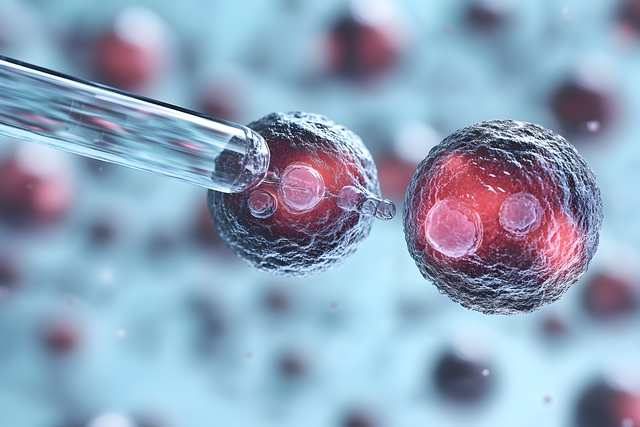IVF and Fertility Treatments: Which is Right for You?
Bringing a child into the world is a dream cherished by many, but for some, the path to parenthood can be fraught with challenges. Infertility affects millions of couples worldwide, prompting them to seek fertility treatments to fulfil their desire for a family.
However, in recent years, advancements in medical science have offered a multitude of options for couples struggling with infertility. Here, among these options, in vitro fertilization (IVF) stands out as one of the most effective and widely used treatments. IVF is just one of many fertility treatments available, each with its own benefits and considerations. In this blog, we'll explore the intricacies of IVF and fertility treatments, and help you determine which option is right for you.
Understanding Fertility Treatments
Before delving into specific fertility treatments, it's essential to understand the different approaches available to couples facing infertility. From medication-based interventions to surgical procedures and assisted reproductive technologies, the spectrum of fertility treatments is vast and diverse. Here are some common fertility treatments:
In vitro Fertilization (IVF)
IVF involves a meticulous process of retrieving eggs from the woman's ovaries, fertilizing them with sperm in a controlled laboratory environment, and carefully transferring the resulting embryos into the uterus. This highly intricate procedure offers hope to couples struggling with infertility by bypassing common reproductive barriers and increasing the likelihood of conception. In this way, IVF has revolutionized assisted reproductive technology, offering a ray of hope to those facing fertility challenges worldwide.
Intrauterine Insemination (IUI)
IVF and fertility treatments, Intrauterine insemination is a simpler fertility treatment. It involves placing specially prepared sperm directly into the woman's uterus at the time of ovulation. This procedure enhances the chances of fertilization by bringing sperm closer to the egg. In this way, it bypasses potential obstacles within the reproductive tract. So, while less invasive than IVF, IUI can be a viable option for couples facing mild fertility issues or as a first-line treatment before considering more advanced interventions.
Donor Eggs/Sperm
For couples facing infertility due to issues with egg or sperm quality, the use of healthy donor eggs or sperm can provide a pathway to parenthood. Here, donor gametes offer the opportunity to achieve pregnancy and biological parenthood when one partner's reproductive cells are compromised. In this way, this option allows couples to fulfil their dream of having a child while addressing the underlying fertility challenges they may face.

Surrogacy
Surrogacy offers a unique solution for couples who are unable to carry a pregnancy to term. In this arrangement, another woman, known as the surrogate or gestational carrier, carries and delivers a child on behalf of the intended parents. Surrogacy enables individuals or couples to experience the joys of parenthood by using their own genetic material while entrusting the gestational process to a surrogate. In this way, it will overcome biological barriers to pregnancy.
Assisted hatching
Assisted hatching is a specialized technique used during IVF to improve the chances of embryo implantation, particularly in older women or those with thick embryo shells. By creating a small opening in the embryo's outer layer, assisted hatching facilitates the embryo's ability to attach to the uterine lining. As a benefit, it increases the likelihood of successful implantation and pregnancy.
Preimplantation Genetic Testing
This is a groundbreaking procedure that allows embryos created through IVF to be screened for genetic abnormalities before implantation. So, by identifying chromosomal anomalies or genetic disorders early in the embryo's development, PGT helps reduce the risk of miscarriage. Further, it improves the chances of a successful pregnancy for couples undergoing IVF.
Surgery
Surgical interventions play a crucial role in addressing anatomical abnormalities that can affect fertility, such as fallopian tube blockages (endometriosis). By correcting structural issues within the reproductive organs, surgery can restore normal function. Thus, it improves the chances of natural conception or the success of fertility treatments like IVF or IUI.
So, from the above discussion, we can say that IVF and fertility treatments come with their own set of considerations, including success rates, risks, costs, and emotional implications. Deciding which treatment is right for you requires careful consideration of your individual circumstances, preferences, and medical advice.
IVF: An Overview
Among the myriad fertility treatment options available, IVF is perhaps the most well-known and widely used. IVF involves-
-
the retrieval of eggs from the woman's ovaries
-
fertilization of these eggs with sperm in a laboratory dish
-
the transfer of resulting embryos back into the woman's uterus
This process bypasses many common causes of infertility, such as blocked fallopian tubes or ovulatory disorders. In this way, it becomes a viable option for couples with various fertility challenges.

Is IVF Right for You?
IVF has helped millions of couples worldwide achieve their dream of parenthood. However, it might not suit everyone's needs equally. So, factors to consider when determining if IVF is right for you include:
-
Underlying Causes of Infertility: IVF may be more suitable for couples with certain infertility factors, such as tubal issues, endometriosis, or unexplained infertility.
-
Age and Ovarian Reserve: IVF success rates decline with age, particularly after the age of 35. Women with diminished ovarian reserve may face lower success rates with IVF.
-
Financial Considerations: IVF can be expensive, with costs varying depending on factors such as clinic location, treatment protocols, and insurance coverage.
-
Emotional Readiness: The IVF process can be emotionally challenging, involving multiple rounds of treatment, potential setbacks, and difficult decisions.
Exploring Alternative Fertility Treatments
IVF is often touted as the gold standard of fertility treatments. However, it's essential to recognize that it may not be the best option for everyone. Alternative fertility treatments, such as intrauterine insemination (IUI), ovulation induction, or surgical interventions, may offer a more suitable and cost-effective approach for some couples. These treatments may be particularly beneficial for individuals with specific fertility challenges or those seeking less invasive options.
Finding the Right Fit
When exploring options for IVF and fertility treatments, it's crucial to work closely with a fertility specialist or reproductive endocrinologist. They can provide personalized guidance and recommendations based on your medical history, diagnostic tests, and treatment goals. Together, you and your healthcare provider can weigh the pros and cons of each treatment option. However, it is important to consider your circumstances and preferences and develop a comprehensive fertility treatment plan tailored to your needs. So, to get full guidance on these treatment options, contact Healing Travel.






Kommentar hinzufügen